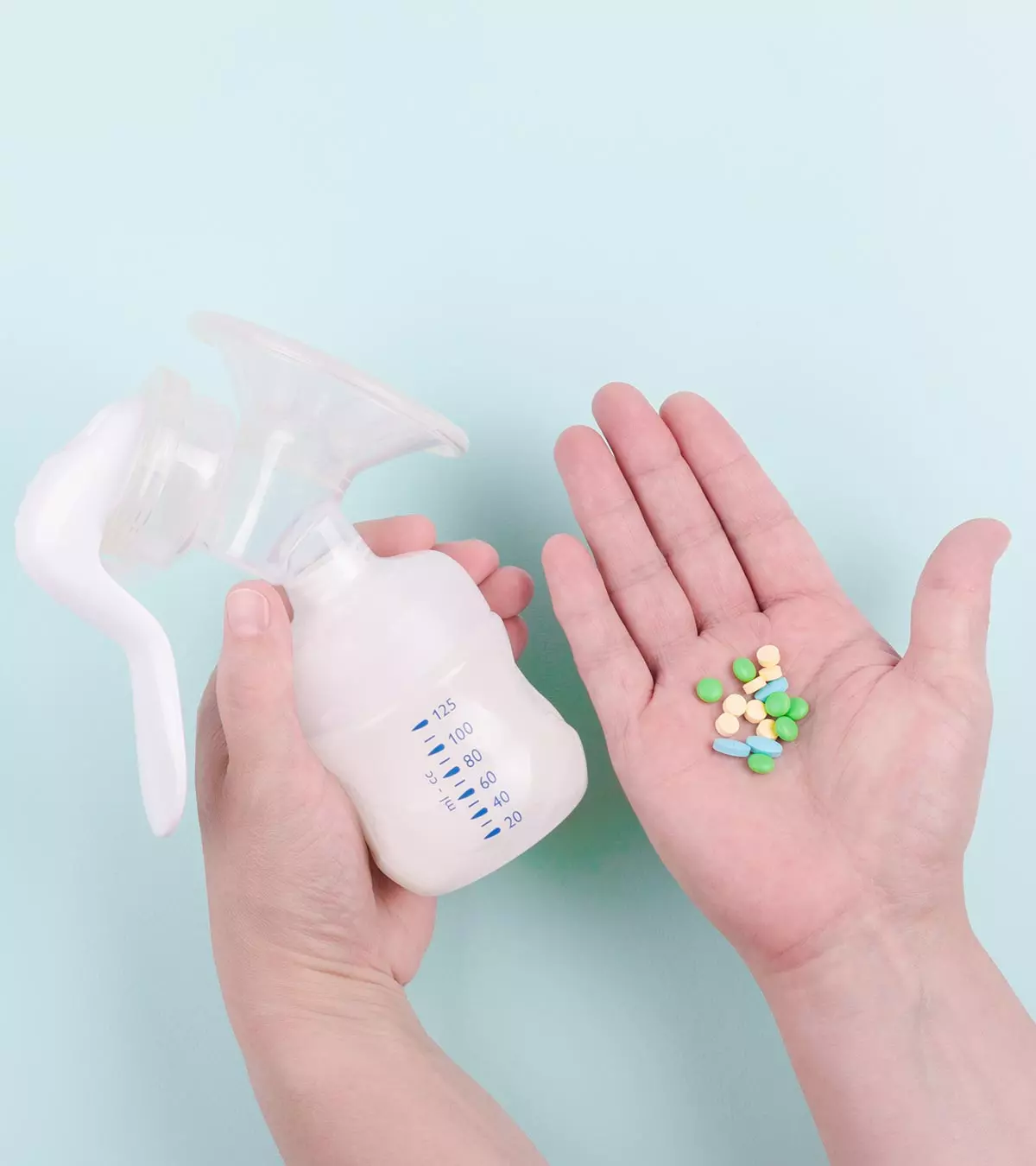
Image: Shutterstock

Loratadine, commonly known by the trade name — Claritin, is an OTC medicine that is used to temporarily relieve the symptoms of hay fever or other allergies such as sneezing, runny nose, and itchiness of the eyes, nose, and throat. But is Loratadine in breast milk safe? It may help to know that while it helps relieve the symptoms mentioned above, it does not help manage hives or other skin allergies (1). Read this post to learn more about loratadine’s benefits, infant safety, and side effects for breastfeeding mothers.
Key Pointers
- Loratadine is a medication used to treat hay fever symptoms in nursing mothers.
- It can be consumed in low (recommended) doses during breastfeeding unless the baby is premature, has health issues, or low birth weight.
- As a small amount of it enters the breast milk, it may cause symptoms in breast-fed infants such as drowsiness, appetite changes, and dry mouth.
- However, reactions such as rashes, nosebleeds, diarrhea, fatigue, sleep changes, dizziness, or breathing problems require medical attention.
Is Loratadine Safe While Breastfeeding?
Yes, it is safe but within limits. As per the recommendations of the British Society for Allergy and Clinical Immunology’s, loratadine can be taken at its lowest dose during breastfeeding (2).
Loratadine passes into the breast milk in low amounts but has minimal sedative effect.
The ingredients of Claritin and Claritin-D are safe while breastfeeding.
However, the doctor may not recommend loratadine during breastfeeding if the baby has low birth weight, was born prematurely or has health issues (3).
Your maternal health condition is also important: If you have liver or kidney disease, inform the physician before he prescribes the medication.
Loratadine comes in syrup, tablet, and dissolvable tablet forms. It is usually taken once a day, either with or without food. Always follow the instructions provided on the packaging or given by your doctor, as taking more than the recommended dose may lead to drowsiness (1). Even if you and your baby do not have any health conditions, you have to limit your intake of loratadine to small amounts as it enters the breast milk.
 Point to consider
Point to considerHow Much Loratadine Does Breast Milk Absorb?
Six women were studied to understand the impact. When they took a single oral dose of 40mg, an average peak milk composition level of 29.2 mcg/L occurred two hours after the dose was taken.
Desloratadine is a major metabolite of loratadine. At 5.3 hours after the dose, 16mcg/L desloratadine occurred at peak level in milk. Over 48-hour time, a total of 11.7mcg of loratadine and its metabolite were excreted in the milk.
However, the dose taken by the women was four times more than the usual dose. And thus, with 10mg dose, a total dose of 3mcg would be expected in the breast milk (4).
The little amount of drug transfer that happens when the drug seeps into your breast milk may not have any adverse effects. But higher doses can prove to be troublesome.
Effect Of Loratadine On Breastmilk

Image: Shutterstock
If antihistamines are taken in relatively higher doses, the basal serum prolactin could decrease in non-lactating women and early postpartum women. But antihistamines do not affect the suckling-induced prolactin secretion. So, in a mother with established lactation, prolactin levels may not affect her breastfeeding ability (5).
In another study, one out of 51 nursing mothers, who were on 10mg loratadine for less than a week at four months postpartum, reported a decrease in the milk production.
If you notice any decrease in lactation while on Loratadine, talk to your doctor, as the drug may be having an adverse effect on maternal safety.
Note: Claritin-D has the decongestant pseudoephedrine, which is categorized as ‘moderately safe’ during lactation (6). However, some lactation experts opine that it can have a major negative effect.
Does Loratadine Impact Nursing Infant?
According to a survey conducted by Teratogen Information Service on 51 nursing mothers, who were on loratadine and had infants over two months old, two mothers reported minor sedation in their babies.
These mothers were on medication for one week or less and took a dose of 10mg each day. Other infant development issues, such as psychomotor skills and weight gain, were on par with the other infants in the control group, who were not exposed to the drug.
In an extension of the study, the researchers did not find differences in sedation or any other side effects in the infants of the mothers who took loratadine and those who did not (7).

Image: Shutterstock
It is a good idea to observe your baby while you are on this medication. Check for symptoms like rashes in babies or noticeable behavioral changes such as heightened fussiness or irritability or sudden changes in their appetite or sleeping pattern. Always observe for sedation, exertion, and dry mouth. Consult with a healthcare provider if you notice any concerning changes.
Side Effects Of Loratadine While Breastfeeding
Loratadine usually produces no harmful side effects. But contact your doctor if you notice any unusual reactions in your body. Also, consult your doctor about any possible side effects of loratadine before you consume it. Prior information helps you prepare for any adverse reactions such as:
- Sedation
- Nausea
- Diarrhea
- Fatigue
- Headache
- Mouth sores
- Dry mouth
- Nosebleed
- Itchy eyes

Image: Shutterstock
- Sleep troubles
Seek medical advice if you experience any severe allergic reactions after using loratadine, such as:
- Severe dizziness
- Rashes
- Swelling of lips, face, throat, eyes or tongue
- Difficulty in breathing
- Itchiness
 Be watchful
Be watchfulOn the bottom line, loratadine is safe to use while breastfeeding. But, try harmless remedies such as steam inhalation or anti-inflammatory herbs.
If your doctor prescribes loratadine while breastfeeding, keep a watch on the side effects. Ask your doctor about the best time to take loratadine. For instance, you can take it just after nursing your baby to minimize the infant’s exposure to the drug.
Frequently Asked Questions
1. Does loratadine pass through breast milk?
Loratadine can be found in trace levels in breast milk. According to studies, an infant would only receive 1% of the maternal dosage (9). Dr. Priyanka Venkataraman, a San Francisco-based board-certified obstetrician and gynecologist, explains, “Loratadine passes through breast milk in small amounts; approximately 3mcg might pass through with a 10mg pdose. However, maternal use of loratadine is not expected to cause any adverse effects in breastfed infants.”
2. Is it okay to take loratadine every day while breastfeeding?
It is unlikely that breastfeeding infants will experience any adverse side effects from a mother taking a standard therapeutic dose of loratadine because the amount of the drug the infant is exposed to through breast milk is minimal. Therefore, it is safe for a breastfeeding mother to take loratadine daily, especially during the allergy season (10).
3. Does loratadine make you gain weight?
Long-term use of loratadine has been linked to the development of obesity-like symptoms and signs of metabolic syndrome. These changes in the body can include significant weight gain, increased abdominal fat, and increased brown fat within the body (11).
Infographic: How Does Loratadine Affect Nursing Mother And Her Baby?
Loratadine is a common allergy medication used to treat symptoms such as runny nose, watery eyes, and sneezing. While it is generally considered safe for breastfeeding mothers, there may be potential side effects. Check out the infographic below to learn about its side effects on nursing mothers and their babies.
Some thing wrong with infographic shortcode. please verify shortcode syntax
Illustration: Is It Safe To Take Claritin (Loratadine) While Breastfeeding?
_while_breastfeeding_illustration.jpg.webp)
Image: Dall·E/MomJunction Design Team
Loratadine is an antihistamine used to treat allergies. Learn about its uses, dosage, side effects, and precautions in this informative video.
References
- Loratadine.
https://medlineplus.gov/druginfo/meds/a697038.html - R J Powell et al.; (2015); BSACI guideline for the management of chronic urticaria and angioedema.
https://pubmed.ncbi.nlm.nih.gov/25711134/ - Antihistamines.
https://www.nhs.uk/conditions/antihistamines/. - J Hilbert et al.; (1988); Excretion of loratadine in human breast milk.
https://pubmed.ncbi.nlm.nih.gov/2966185/ - I E Messinis et al.; (1985); Histamine H1 receptor participation in the control of prolactin secretion in postpartum.
https://pubmed.ncbi.nlm.nih.gov/3928731/ - Jeanne P. Spencer et al.; (2001); Medications in the Breast-Feeding Mother.
https://www.aafp.org/pubs/afp/issues/2001/0701/p119.html - Which oral antihistamines are safe to use whilst breastfeeding?
http://www.midlandsmedicines.nhs.uk/filestore/QA206_Antihistamines_BM.pdf - Loratadine (Clarityn).
https://www.nhs.uk/medicines/loratadine/ - Loratadine (Claritin®)
https://mothertobaby.org/fact-sheets/loratadine-pregnancy/ - So M et al.; (2010); Safety of antihistamines during pregnancy and lactation.
https://www.ncbi.nlm.nih.gov/pmc/articles/PMC2868610 - Gasheva OY et al.; (2019); Prolonged intake of desloratadine: mesenteric lymphatic vessel dysfunction and development of obesity/metabolic syndrome.
https://www.ncbi.nlm.nih.gov/pmc/articles/PMC6383386/
Community Experiences
Join the conversation and become a part of our nurturing community! Share your stories, experiences, and insights to connect with fellow parents.
Read full bio of Melissa Kotlen
- Dr. Priyanka Venkataraman is a board-certified ob/gyn, life coach, parent coach, and mother. She is the founder and CEO of Wayfinding Moms, a community for women. Dr. Venkataraman graduated from Boston University School of Medicine and did the residency program in obstetrics & gynecology at St. Luke University.
 Dr. Priyanka Venkataraman is a board-certified ob/gyn, life coach, parent coach, and mother. She is the founder and CEO of Wayfinding Moms, a community for women. Dr. Venkataraman graduated from Boston University School of Medicine and did the residency program in obstetrics & gynecology at St. Luke University.
Dr. Priyanka Venkataraman is a board-certified ob/gyn, life coach, parent coach, and mother. She is the founder and CEO of Wayfinding Moms, a community for women. Dr. Venkataraman graduated from Boston University School of Medicine and did the residency program in obstetrics & gynecology at St. Luke University. - Parmeet Kaur is a physiotherapist specializing in pelvic floor and vestibular rehabilitation. She earned her bachelor's degree in physiotherapy from Kurukshetra University and is currently practicing in Ontario, Canada.
 Parmeet Kaur is a physiotherapist specializing in pelvic floor and vestibular rehabilitation. She earned her bachelor's degree in physiotherapy from Kurukshetra University and is currently practicing in Ontario, Canada.
Parmeet Kaur is a physiotherapist specializing in pelvic floor and vestibular rehabilitation. She earned her bachelor's degree in physiotherapy from Kurukshetra University and is currently practicing in Ontario, Canada.
Read full bio of Shivali Karande
Read full bio of Rohit Garoo
Read full bio of Vidya Tadapatri

















